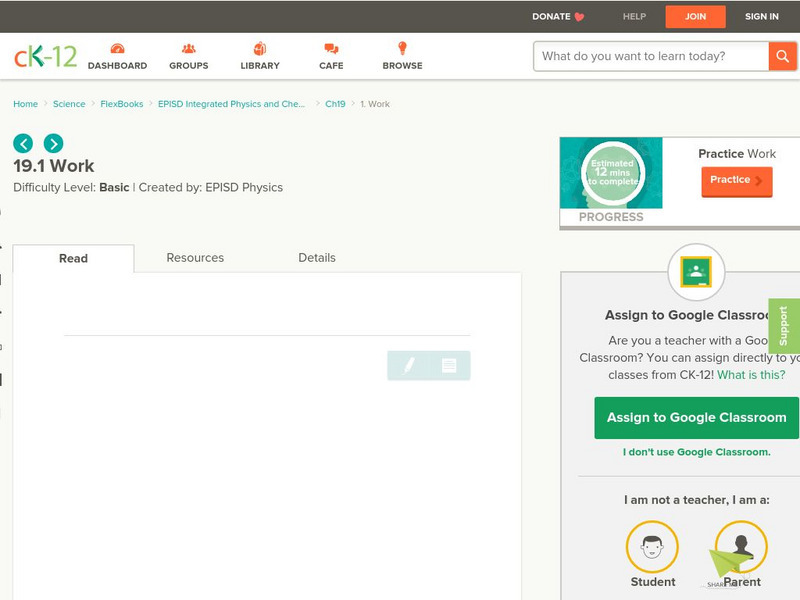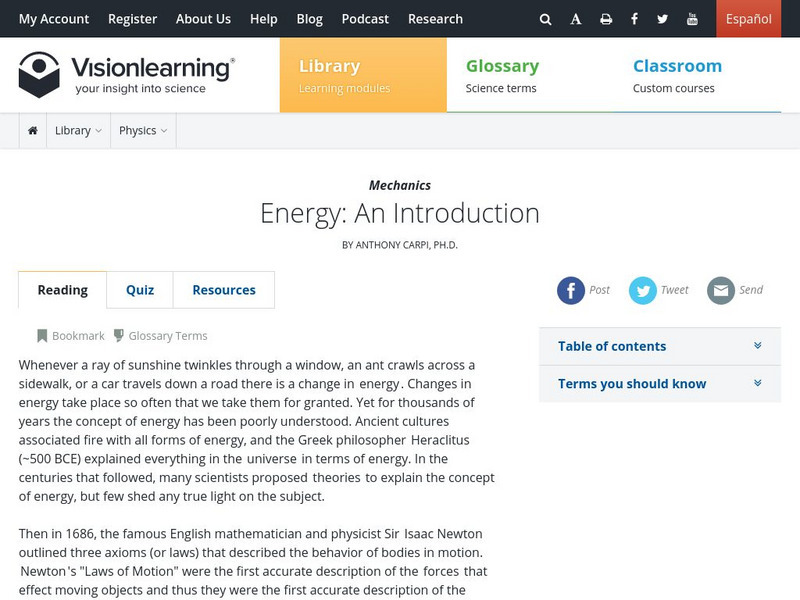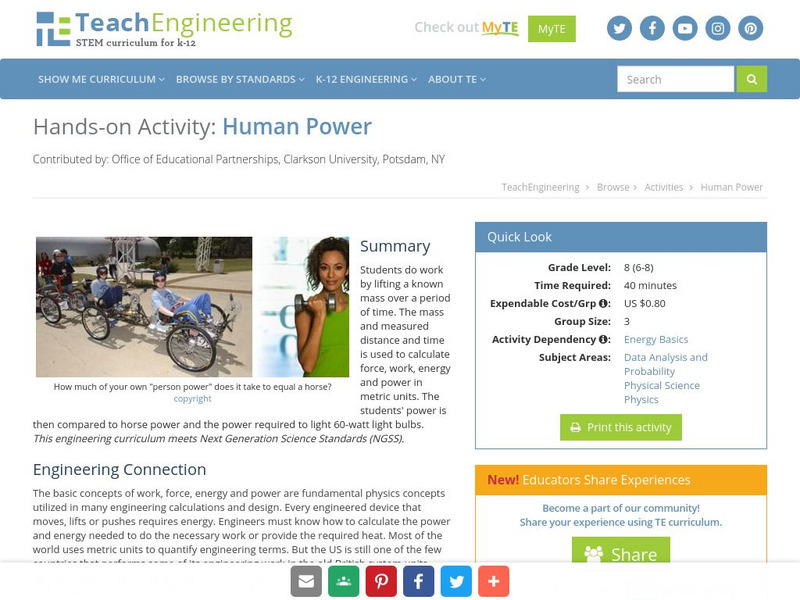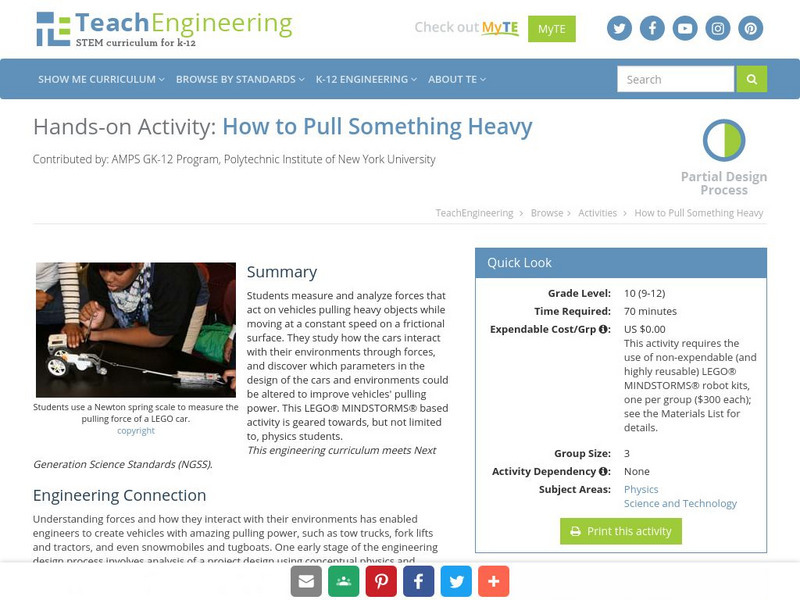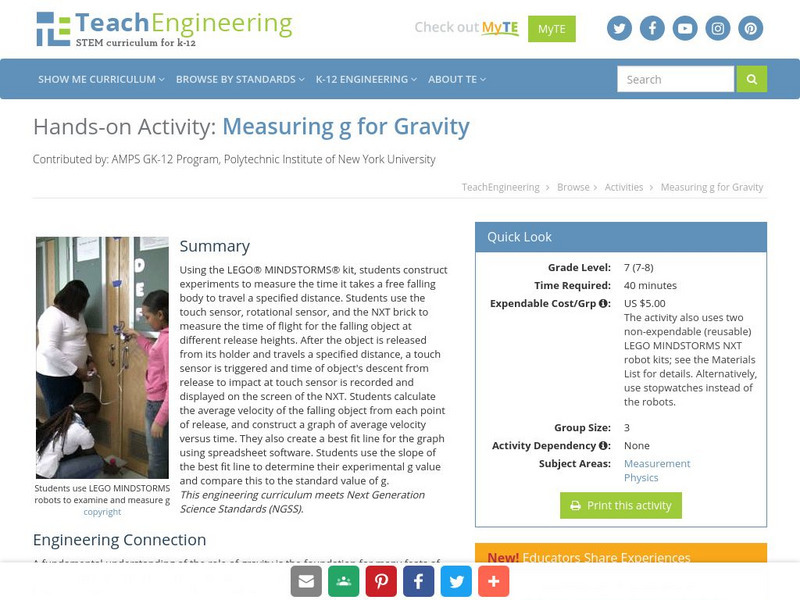Sophia Learning
Sophia: Newton's Second Law: Lesson 3
This lesson introduces Newton's Second Law and explains that force is equal to mass times acceleration. It is 3 of 3 in the series titled "Newton's Second Law."
Scholastic
Scholastic: Three D's of Speed
Dive into hands-on aerodynamics experiments and dynamic STEM activities that support core science lessons in force, momentum, and speed. This site provides teacher, student and video resources.
CK-12 Foundation
Ck 12: Newton's First and Second Laws of Motion
[Free Registration/Login may be required to access all resource tools.] Students explore the concept of inertia and how it applies to Newton's First Law. They also learn about Newton's Second Law and answer both numerical and conceptual...
CK-12 Foundation
Ck 12: Newton's Third Law of Motion
[Free Registration/Login may be required to access all resource tools.] Students find out about Newton's Third Law of Motion, and explore situations involving multiple objects.
CK-12 Foundation
Ck 12: Work
[Free Registration/Login may be required to access all resource tools.] In this module, calculate work and explain how it relates to the overarching idea of energy.
University of Colorado
University of Colorado: Ph Et Interactive Simulations: Forces and Motion: Basics
Explore the forces at work when pulling against a cart, and pushing a refrigerator, crate, or person. Create an applied force and see how it makes objects move. Change friction and see how it affects the motion of objects.
University of Colorado
University of Colorado: Ph Et Interactive Simulations: Gravity Force Lab
Manipulate the mass and distance of two objects to see how these properties change the gravity force.
Vision Learning
Visionlearning: General Science: Energy: An Introduction
Instructional module focusing on energy. Discussion includes forms of energy, conservation of energy, and the laws of thermodynamics. Site also includes an interactive practice quiz and links relating to the topic.
Georgia Department of Education
Ga Virtual Learning: Forces
Students learn about various forces and how they relate to everyday life in this interactive learning module.
Georgia Department of Education
Ga Virtual Learning: Ap Physics 1: Newton's Laws of Motion
Newton's three laws are deceptively simple, but they are the underpinning of all of physics and govern the mechanics all of your actions in everyday life. Take an in-depth look at these laws in this learning module.
Georgia Department of Education
Ga Virtual Learning: Ap Physics 1: Simple Harmonic Motion
In this unit, students will discover the period of time of one oscillation, the frequency of oscillation, the object displacement, its velocity, and its acceleration. They will also discover how to apply the principles of conservation of...
OpenStax
Open Stax: Newton's Second Law of Motion: Concept of a System
In the following interactive students will begin to define net force, external force, and system and understand Newton's second law of motion. They will also apply Newton's second law to determine the weight of an object.
OpenStax
Open Stax: Normal, Tension, and Other Examples of Forces
In the following interactive students will begin to define normal and tension forces. They will apply Newton's laws of motion to solve problems involving a variety of forces and use trigonometric identities to resolve weight into...
University of Colorado
University of Colorado: Ph Et Interactive Simulations: Hooke's Law
Stretch and compress springs to explore the relationships between force, spring constant, displacement, and potential energy. Investigate what happens when two springs are connected in series and parallel.
E-learning for Kids
E Learning for Kids: Science: Egypt: What Can Forces Do?
A learning module reviewing how much force is needed to push or pull objects. Also learn about the force of gravity.
TeachEngineering
Teach Engineering: Human Power
Students do work by lifting a known mass over a period of time. The mass and measured distance and time is used to calculate force, work, energy and power in metric units. The students' power is then compared to horse power and the power...
TeachEngineering
Teach Engineering: Engineering Pop Ups
Students learn about applied forces as they create pop-up-books - the art of paper engineering. They also learn the basic steps of the engineering design process.
TeachEngineering
Teach Engineering: Watch It Slide!
Students use inclined planes as they recreate the difficult task of raising a monolith of rock to build a pyramid. They compare the push and pull of different-sized blocks up an inclined plane, determine the angle of inclination, and...
TeachEngineering
Teach Engineering: Sum It Up: An Introduction to Static Equilibrium
Students are introduced to static equilibrium by learning how forces and torques are balanced in a well-designed engineering structure. A tower crane is presented as a simplified two-dimensional case. Using Popsicle sticks and hot glue,...
TeachEngineering
Teach Engineering: Truss Destruction
Students work within constraints to construct model trusses and then test them to failure as a way to evaluate the relative strength of different truss configurations and construction styles. Each student group uses Popsicle sticks and...
TeachEngineering
Teach Engineering: Friction Force
Students use LEGO MINDSTORMS robotics to help conceptualize and understand the force of friction. Specifically, they observe how different surfaces in contact result in different frictional forces. A LEGO robot is constructed to pull a...
TeachEngineering
Teach Engineering: How to Pull Something Heavy
Students measure and analyze forces that act on vehicles pulling heavy objects while moving at a constant speed on a frictional surface. They study how the cars interact with their environments through forces, and discover which...
TeachEngineering
Teach Engineering: Measuring G
Using the LEGO MINDSTORMS NXT kit, students construct experiments to measure the time it takes a free falling body to travel a specified distance. Students use the touch sensor, rotational sensor, and the NXT brick to measure the time of...
TeachEngineering
Teach Engineering: Measuring Pressure
Students learn first-hand the relationship between force, area and pressure. They use a force sensor built from a LEGO MINDSTORMS NXT kit to measure the force required to break through a paper napkin. An interchangeable top at the end of...




